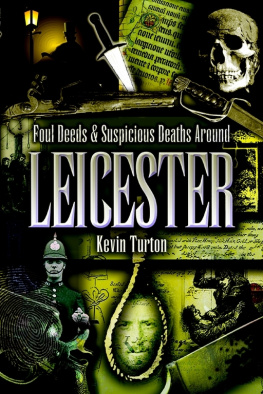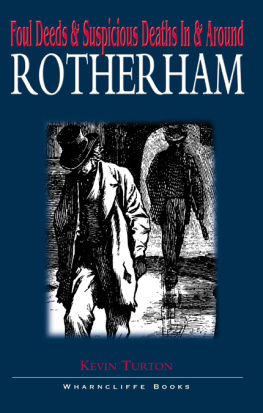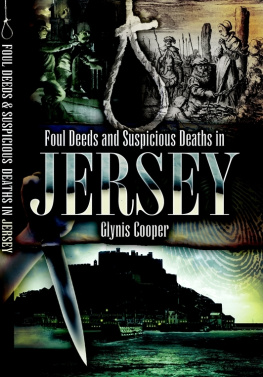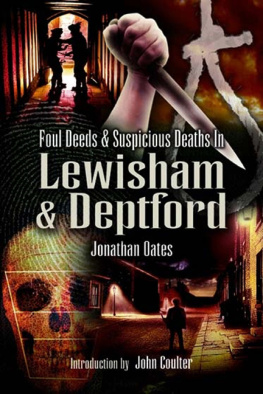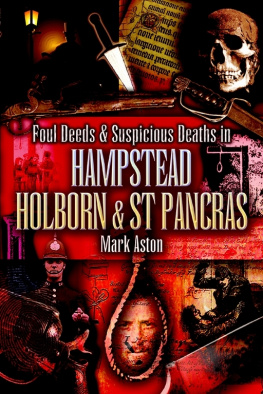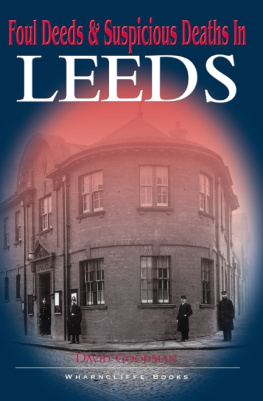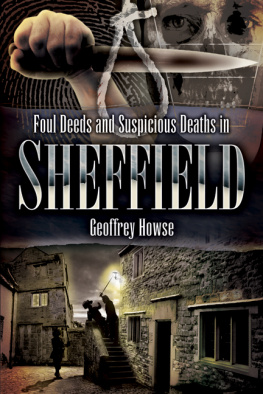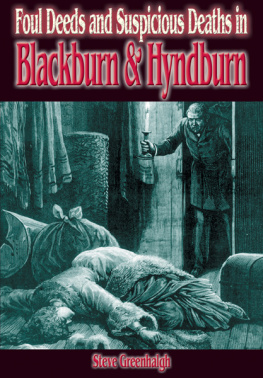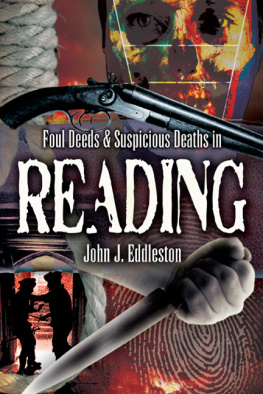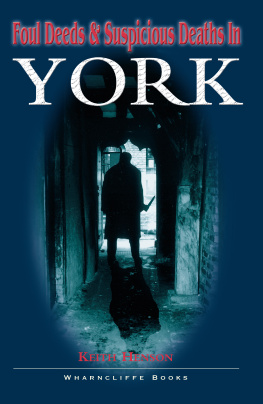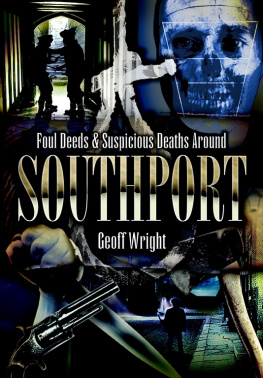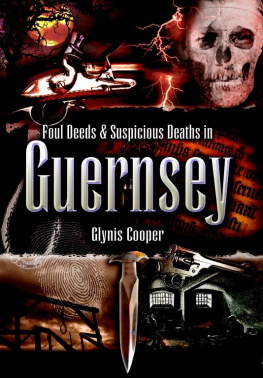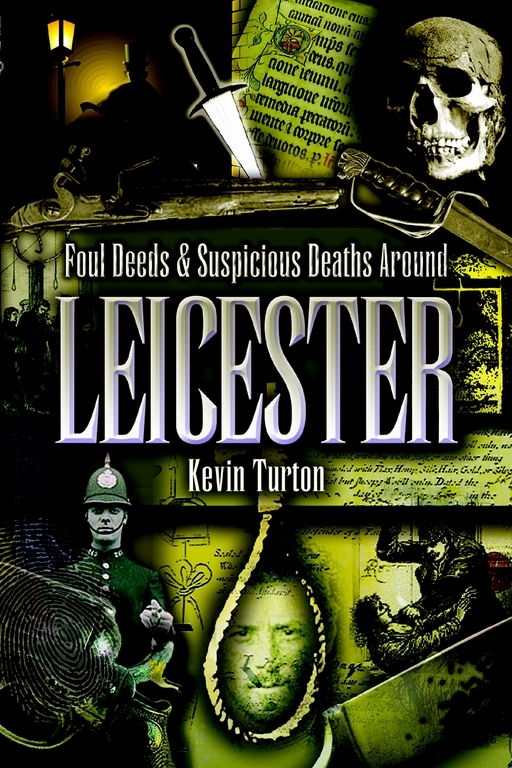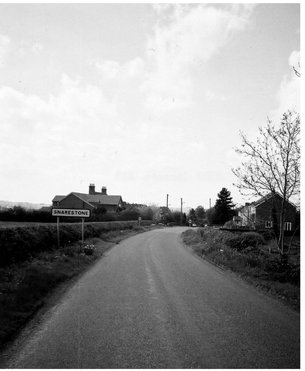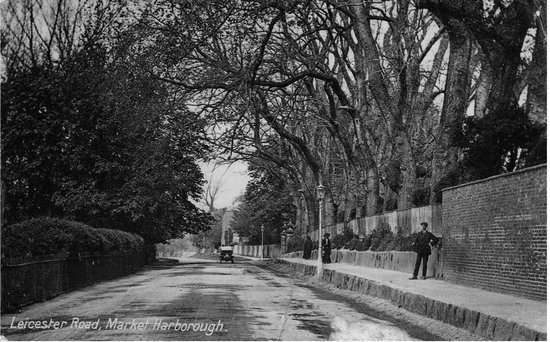Other titles in the series
Foul Deeds and Suspicious Deaths in Bolton, Glynis Cooper
ISBN: 1-903425-63-8. 9.99
Foul Deeds and Suspicious Deaths in Londons East End, Geoffrey Howse
ISBN: 1-903425-71-9. 10.99
Foul Deeds and Suspicious Deaths in & around Durham, Maureen Anderson
ISBN: 1-903425-46-8. 9.99
Foul Deeds and Suspicious Deaths in and around Halifax, Stephen Wade
ISBN: 1-903425-45-X. 9.99
Foul Deeds and Suspicious Deaths in Leeds, David Goodman
ISBN: 1-903425-08-5. 9.99
Foul Deeds and Suspicious Deaths in Nottingham, Kevin Turton
ISBN: 1-903425-35-2. 9.99
Foul Deeds and Suspicious Deaths Around Derby, Kevin Turton
ISBN: 1-903425-76-X. 9.99
Foul Deeds and Suspicious Deaths in and Around Scunthorpe, Stephen Wade
ISBN: 1-903425-88-3. 9.99
More Foul Deeds and Suspicious Deaths in Wakefield, Kate Taylor
ISBN: 1-903425-48-4. 9.99
Foul Deeds and Suspicious Deaths in York, Keith Henson
ISBN: 1-903425-33-6. 9.99
Foul Deeds and Suspicious Deaths on the Yorkshire Coast, Alan Whitworth
ISBN: 1-903425-01-8. 9.99
Foul Deeds and Suspicious Deaths in Coventry, David McGrory
ISBN: 1-903425-57-3. 9.99
Foul Deeds and Suspicious Deaths in Manchester, Martin Baggoley
ISBN: 1-903425-65-4. 9.99
Foul Deeds and Suspicious Deaths in Newcastle, Maureen Anderson
ISBN: 1-903425-34-4. 9.99
Foul Deeds and Suspicious Deaths in Hull, David Goodman
ISBN: 1-903425-43-3. 9.99
Foul Deeds and Suspicious Deaths Around Newport, Terry Underwood
ISBN: 1-903425-59-X. 9.99
Please contact us via any of the methods below for more information or a catalogue.
WHARNCLIFFE BOOKS
47 Church Street Barnsley South Yorkshire S70 2AS
Tel: 01226 734555 734222; Fax: 01226 724438
E-mail: enquiries@pen-and-sword.co.uk
Website: www.wharncliffebooks.co.uk
CHAPTER 1
The Price of Envy The Murder of Acres Fowkes 1855
... William saw a sudden movement
outside the window...
J ohn Fowkes had been born into a comparatively wealthy family but, it could be argued, had never benefited from that wealth. His father, known to have walked a fine line where the law was concerned, had inherited the one hundred acre farm at Snareston, including a number of cottages, long before he had been born. Believed to have been a Resurrectionist before that inheritance came about, he had been suspected for years of having stolen and sold freshly buried corpses to various dubious medical establishments in Birmingham. The notion that he would have embraced farming in the manner he did had surprised most that knew him. Not only had he taken to the life, he had done so spectacularly, proving himself surprisingly successful in all aspects of agriculture, and turning himself into an astute businessman. The wealth he accumulated, however, was never to be spent on the education of his children.
John was the eldest of three brothers and two sisters, none of whom had received anything other than a simple, rudimentary schooling and, as he grew older, he began to resent that omission from his childhood. Always known by the nickname of butcher by any that knew him in the village on account of having taken up the trade as a young man, he had initially tended to work from premises in the village. But by the mid 1840s, possibly still feeling somewhat embittered, he had enlisted in the army and moved away from Leicestershire. It did not last long. After serving with his regiment in Ireland he began to make overtures toward his father for money. Disaffected by military life, and quite probably unable to accept the discipline it also demanded, he made the decision that the lesser of the two evils was home and family.
The small village of Snareston today. The author
By 1855 he was back on the farm working alongside his younger brother, William. As a farm labourer his sense of discontent was ever stronger, as by now he believed his station in life to have been thoroughly usurped by his own nephew. His father, now an old man, may have helped him escape the army but was never going to allow either himself or his brother any form of responsibility or control over the farm. Instead, he had, over the latter years of his life, invested money in his daughter Elizabeths son, Acres Fowkes. Whether because age had brought with it a realisation that none of his own family would be capable of taking over the farm on his death, or simply that he regretted his refusal to educate his sons effectively when he had had the opportunity, he never explained. Either way his nephew was the beneficiary of good schooling for much of his life and at its conclusion had then been brought, with his mother, to live in the farmhouse and take full business control of the farm. As the year drew to a close Acres responsibility had even been widened, not only to control the farms business accounts but also to oversee much of the day-to-day running, which meant he had, in all but name, become the overall farm manager. This power enabled him to manage the labour force and with it the daily working lives of his two uncles. Incensed by all he saw John refused to live in the same house and moved into a farm cottage some half a mile away. Bitterly resentful, he made no secret of his growing hatred for the young man and most of the villagers knew he harboured sentiments that were both serious and dangerous. In fact they helped fuel them. On 25 November of that same year John was told, by a man he knew well, that Acres had taken 700 from his father. John wanted to know why.
From an Edwardian postcard. Authors collection
With that aim in mind he had stormed into the cowsheds early that evening in search of his brother William and, when he finally found him, he demanded to know if the rumour was true. Whether William could possibly have known is extremely doubtful but in an attempt to calm his brother he told him that he believed the sum of money that had been given over was only 100. It did little to assuage Johns anger and he swore vengeance for what he believed was an injustice committed by his father. He told William he would put an end to Acres involvement in the farm and leaving him to cogitate on exactly what he meant by that he stormed off toward his own house.
That same night, whilst all this was taking place, Acres Fowkes was sitting in the Square and Compass public house drinking with the village policeman, PC Cooper. The two men had known each other for several years and were considered friends, and when the landlord shouted time he invited the constable back to the farmhouse for another drink. Not one to refuse hospitality, PC Cooper readily accepted and the two arrived back at a little after 11 pm. William was already in the house having laid out fresh straw for the cattle. His father, who suffered badly from asthma, was standing at the open kitchen window trying to suck in fresh air. The three men were familiar with his symptoms, which did not cause them too much concern and they left him where he stood. Acres suggested they all have a drink and after drawing beer from a cask kept in the kitchen each pulled up a chair and sat by the fire. At about the same time William saw a sudden movement outside the window where his father stood and gave a startled shout, Theres Butcher! Everyone turned to look and as they did so the glass pane shattered. There was a gunshot and Acres Fowkes instantly fell backwards from his chair wounded in the head. PC Cooper was the first to react and ran toward the door. He found his exit barred from the outside by means of a length of wood, which had been passed through the door latch handle and securely tied to a post beside the houses back wall. It took several minutes for he and William to cut through the rope and by the time they had succeeded in reaching the farmyard, John Fowkes had fled. Whether through shock or uncertainty the young constable made no attempt to follow the killer. Instead, he organised someone to fetch Spencer Edmonds, surgeon, from Appleby whilst he returned to Snareston where he despatched another constable to Ashby de la Zouch to fetch sergeant John Platts.

